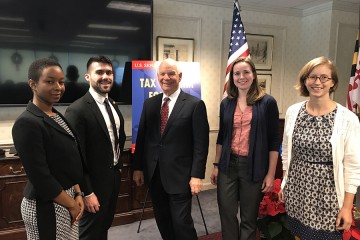The sweeping federal tax overhaul expected to be signed into law this week preserves key existing benefits for students that had faced the threat of elimination, but it also includes a number of changes and measures likely to affect Johns Hopkins and members of its community.
University and health system leaders spent the weekend assessing the impact of the legislation, which was made public Friday evening. The House and Senate are expected to approve the bill this week, clearing the way for President Donald Trump to sign it into law.
The final bill does not include several provisions found in versions passed by the House and Senate last month, including:
- The elimination of a tax exemption on tuition waivers for graduate students
- The elimination of the student loan interest deduction
- The elimination of tax exemptions for tuition assistance for employees and their dependents
"I'm encouraged to see Congress affirm longstanding bipartisan support for tax provisions that enable students to access higher education," Johns Hopkins University President Ronald J. Daniels said. "But I remain deeply concerned by provisions in the final bill that will have detrimental impacts on access to higher education and our nation's overall competitiveness in the long term. We must ensure that universities across this country can continue playing a critical role in educating the next generation, bolstering the U.S. economy, and developing solutions to many of society's most vexing challenges."
Leaders and students from Johns Hopkins and across higher education voiced concern that changes affecting students in particular would have a dramatic impact on college affordability, putting the cost of a college education out of reach for many. JHU representatives communicated these concerns on Capitol Hill and worked closely with peer institutions and higher education associations on advocacy efforts.
"We recognize that many students from Johns Hopkins and across the country undertook significant effort to reach out to Congress during this fast-moving discussion, and believe your outreach was an influential element of this important debate," Nancy Kass, vice provost for graduate and professional education; and Kevin Shollenberger, vice provost for student affairs, wrote in a message to graduate students on Saturday. "We salute you and encourage you to continue to be engaged in the public policymaking arena."
The final bill does include several items that Johns Hopkins representatives advocated against, including:
- The creation of a 1.4% excise tax on the endowments of some private colleges and universities (Johns Hopkins would not be affected by this tax at this time)
- The elimination of the individual mandate for health insurance beginning in 2019
The tax package took shape over the past few weeks as House and Senate Republicans worked to reach an agreement. The provisions included in the bill are expected to take effect in 2018.
Posted in University News, News+Info
Tagged tax policy









